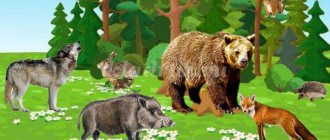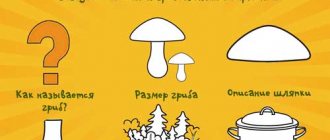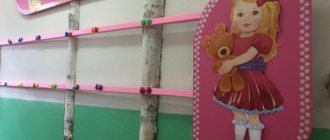Didactic games (verbal) for children 5-6 years old
Didactic games (verbal) for older preschoolers
Author : Pashkova Larisa Aleksandrovna, teacher of speech therapy group, MBDOU "Shegarsky kindergarten No. 1 of a combined type" Games can be used in the learning process, in educational work.
This material is recommended for teachers of various types of institutions, including additional education, educators, and teachers. The games are intended for older children. Games were used in the form of separate activities, games and exercises. Game "Carpenter"
Target. We develop children's imagination and verbal creativity; We teach what tools a carpenter uses when working. Description of the game. The presenter asks the children riddles on a given topic. For quick and correct answers, players are given chips. And at the end of the game, when counting, the most savvy one receives a prize. He bows, he bows, When he comes home he will stretch out. (Axe) A toothy animal gnaws an oak tree with a whistle. (Saw) The fat one will beat the thin one, the thin one will beat something. (Hammer and nail) Wooden river, Wooden boat, And above the boat Wooden smoke flows. (Plane)
Game "Fun Olympics"
Target. We teach children to solve riddles, strengthen speech skills - evidence, develop speech skills - description. Description of the game. Children are divided into two teams. Each team comes up with a name for itself. Teams compete to solve riddles about sports. Players must correctly guess the riddle and prove the answer if they can beat it. For each correct answer, the team receives an Olympic ring (hoop). The first team to collect 5 rings is declared the winner. Small in stature, but brave, he galloped away from me. (Ball) A white goose is swimming - The belly is wooden, The wing is linen. (Yacht) The river is flowing - we are lying, Ice on the river - we are running. (Skates) Wooden horses gallop in the snow, but don’t fall into the snow. (Skis) When spring takes its toll, And the streams run ringing, I jump over it, And she jumps over me. (Jump rope) Legs are moving along the road And two wheels are running. The riddle has an answer: This is my... (Bicycle)
Game "Sounds Mixed Up"
Target. Preparing children for sound analysis; We develop auditory and visual memory. Description of the game. The presenter reads funny poems, deliberately making mistakes in the words. The child names the word correctly and says what sounds the pairs of words differ in. I found a plum... blouse, Fenya put on... a bone. Ripened on the tree... a caftan, In winter I put on... a chestnut. The count sat on a tree, and the rook lives in a beautiful house. The children grew green in the park, and the branches went out for a walk. Cats fly in the forest in the summer, hunt mice... midges. The pussy has clawed... slippers, Vika has brand new... paws. I have a long way to go... stump, I'd rather sit on... laziness.
Game "Additions"
Target. Develops children's speech creativity. Description of the game. The presenter reads poetry without the last word. Children must quickly find the right word. For each correct answer, the child receives a chip. The winner will be the one with the most chips. From the sky all the fluffs glide - Silvery... (snowflakes) Architects are creators Build wonderful... (palaces) Once upon a time there was a cheerful gnome. He built in the forest... (house) In this house, you trust me, Locked securely... (door) The crust of snow has hardened, Ours will be slippery... (slide) The baby has a rattle Very noisy... (toy) Our children know: Hide and seek is the best … (a game)!
We recommend watching:
Didactic games with sand for children 3-4-5 years old
Didactic game for preschoolers 5-6 years old “Find the differences” Didactic game for children of the older group. Types of work Didactic game on cognitive development for children 6-7 years old
Similar articles:
Didactic game “Collect a caterpillar” for children 5-6-7 years old
Didactic game “Find a Pair” for children 3-4 years old
Didactic game "Flowers" for children 5-6-7 years old
Didactic game for the development of fine motor skills of children 3 – 7 years old
Didactic game for preschoolers. Formation of ideas about time
Let's play and develop
Word games for preschoolers are a good way to have fun and usefully spend time.
Firstly, such games cope “excellently” with the main task - to captivate the child, have fun, and compete.
Secondly, word games focus the child’s attention on words and awaken interest in his own speech. And this is important, since this is the first step towards the development of competent oral and written speech.
Thirdly, games with words expand vocabulary, promote the development of memory, thinking, and develop intelligence.
Letter
We name words starting with the same letter one by one. The one who couldn't give an answer loses.
Last letter
We name words in turn starting with the last letter of the previous word. The one who finds it difficult to answer loses.
Rhyme
We select a rhyme for the word one by one. We can help each other. The main thing is to have fun and enjoy the game.
Suitcase
The game begins with the phrase “I got ready for a hike and put it in my suitcase…….”. Next, the adult adds the name of the item that he would like to take with him. For example, a rope. The child says the same phrase and adds his own object, etc. It is important not to get confused and to name each time all the items that were previously placed in the suitcase. The game develops memory well.
Forbidden word
The adult plays the role of leader. His task is to come up with questions for the child that imply the answers “Good” and “Bad”.
The child must answer questions without using these words. They are forbidden. Questions might be something like this:
Puzzles
An adult makes a wish for an object within sight. The child should, by asking questions, try to guess what kind of object it is. If the child has difficulty coping with this, switch roles and show the child what questions to ask and what to pay attention to (color, size, location, hard or soft, living or inanimate, etc.).
Tongue Twisters
Invite the children to compete in rapid speaking. Start with simple tongue twisters. Then you can choose something more complicated. Undoubtedly, tongue twisters have a beneficial effect on the development of children’s speech and train memory and attention. In addition, when children tell tongue twisters, they sometimes make mistakes and funny moments result. The game is accompanied by laughter. Children try to concentrate and “talk over” their opponent. And they succeed. Only until the first mistake. And again the children burst into cheerful laughter.
Games for children on verbal intelligence
I recently heard this phrase – verbal intelligence. It turns out that it begins to form in early childhood, and in the future it affects a person’s position in society and his career growth. In general, this is a very important and necessary thing. Therefore, I was concerned with the question “How to develop verbal intelligence in my son?” And, interestingly, I found several games for children that help develop this necessary thing. I suggest you get to know them too.
Pick a pair
You can start with a simple game. Invite your child to continue the sentence and choose the correct pair:
Cow-calf
Leg - hand
Chicken - …
Time ago
For this game you need to choose a theme. For example, “Shop” or “Forest”. Each participant (it will be easier if an adult starts the game) says a short story. But the main thing is that he says “backwards.” That is, first how the story ended, and at the very end about how it all began.
You can practice on famous fairy tales, and only then move on to your own stories (tested, it’s easier this way).
Domino
For this game we use cards from children's dominoes. But these can be pictures from magazines and drawings.
So, the presenter gives each player a card (and places it face down so that none of the participants can see which picture the other player has). The first player places his card face up in the middle of the table and begins the story. It could be a fantastic story, a horror story, or just a story about what is shown in the picture.
The story does not need to end; at a certain moment (you can agree on a conditional signal that the presenter will give) the turn passes to the next participant. He also places his card in the middle of the table, face up, and continues the story. That is, his story should be, on the one hand, a continuation of the story of the first player, and on the other, his own story with individual details.
The last player must continue the story of the previous one, introduce his “card” hero and finish the story.
Create a proverb
For this game you will need preparatory material. In advance, I wrote down on a piece of paper the proverbs we know (and Styopka knows a lot of them, our grandmother is simply a treasure trove of proverbs).
I wrote out proverbs in this way: in the left column is the beginning, in the right column is the end of the proverb.
I wrote it in large block letters (so my son could read it faster). I number each proverb. I put an hourglass on the table and Styopka begins to connect the beginning with the end. It looks something like this:
A coward and a cockroach 1 - where the wolf walked among the shepherds in the forest 2 - hurry up to listen to what Dema is like 3 - takes him for a giant Don’t rush to answer 4 - but he didn’t see any wood It’s bad for the sheep 5 - that’s how it is at his home
We compose the answers as follows:
1-3
2-4
3-5
4-2
5-1
If you didn’t have time to find a pair, and the sand in the watch had already poured out, you lost.
To each his place
A game for children, built similar to the previous one. Only here I write proverbs and change words. You need to make up the correct phrase from the words. For example:
Mute, tongue, without, bell, etc. (And the bell is silent without a tongue)
Idleness, small, deed, big, better (Small deed is better than big idleness)
Speak boldly, a good deed, speak about (Speak boldly about a good deed)
And, a ball, a thread, along, reach, to (Along the thread and they reach a ball)
It happens!
In the game for children “It Happens!” all participants take turns telling something incredible (about things, a natural phenomenon, an unusual animal...). The winner is the one who tells four exciting and interesting stories and no one ever says to him: “This happens!”
Come up with your own
Again, you can practice on famous fairy tales. The presenter reminds the plot, and the players’ task is to come up with original names. For example, “Kolobok” - “Grandson made of dough”, “Outwitted the fox”, “Escaped from relatives”...
And then you can move on to unfamiliar stories. Read and come up with names. I also like this game because it teaches you to think creatively. I myself enjoy playing it.
Same signs
We haven’t fully mastered this game for children yet, so I admit, it’s still a bit tricky. But we do not despair, but continue to train.
So, the presenter sets the task - to come up with objects with similar characteristics. For example, round and flat. It could be a pancake, a circle drawn on the asphalt, a crushed tire...
As the game progresses, the tasks become more difficult. There may be more signs, but examples are no longer easy to find. The hardest thing is to find objects that perform opposite functions. For example, a window (opens and closes), a hand (strokes and hits).
The one who comes up with the most answers wins.




